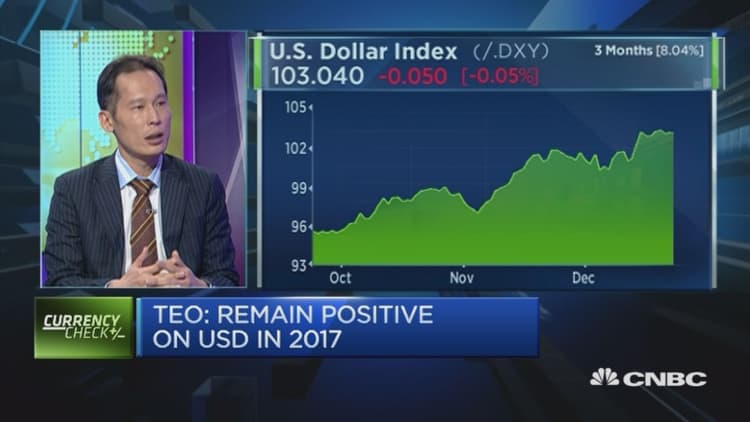
The greenback appeared set to keep flexing its muscles, with the potential for the U.S. Federal Reserve to increase interest rates more than expected, said Roy Teo, senior foreign-exchange strategist at ABN AMRO Bank.
"Right now, if you look at Fed fund futures, slightly more than two rate hikes are already priced in so potentially we could see a bit of room for the dollar to recover," Teo told CNBC's "Street Signs" on Friday.
Teo said he expected three rate hikes this year, in line with the Fed's guidance, but he added, "There's some market speculation that they may be slightly behind the curve [and] may even move up to four."
The dollar has already surged in the wake of Donald Trump's surprise election win in the U.S. and as the Fed surprised markets at its meeting last week by indicating it would likely hike rates three times next year, a faster rate of tightening than the widely expected two times.
As was widely expected, the Fed also increased interest rates for only the second time in a decade, hiking by 25 basis points to a target range of 0.5 to 0.75 percent.
Trump's rhetoric on the campaign trail, including promises of substantial infrastructure projects, appeared set to boost the government's deficit spending, likely sending U.S. interest rates and inflation higher, which would further goose the dollar.
The , which measures the greenback against a basket of currencies, has surged to as high as 103.65 on Tuesday, according to Reuters data, its highest since December 2002. At 12:25 p.m. HK/SIN, the dollar index was at 103.040.
Teo said he remained positive on the dollar's direction, but said that after the surge, the greenback may see a correction or profit-taking early in the new year.
"We do expect the dollar to continue to be strong by end 2017 but I think in the short term, it may be a bit too frothy," he said. "We have recommended clients to go long the dollar after the Trump election, but at this moment, we would say be a bit cautious if you are not already long dollars."
He said he was forecasting the euro would fall to $0.95 next year. The euro was fetching $1.0440 at 12:46 HK/SIN on Friday. Teo also expected Asian currencies would continue to underperform in general, with the Singapore dollar and vulnerable to higher U.S. yields and potential disruptions to trade with the U.S.
Teo also cited the high level of uncertainty ahead for taking a cautious view.
"Nobody knows for sure what concrete policy measures will materialize under Donald Trump. Expectations are relatively high," he said.
He added that the strong dollar may also have broad "spill back" effects on U.S. exports, inflation and company profits.

Analysts have broadly cited an unprecedented level of policy uncertainty heading into a Trump administration, not simply on what campaign promises would actually be pursued and which will prove to be merely aggressive rhetoric, but also what could pass through Congress.
John Lilley, managing director at Taurus Wealth Advisors, told CNBC's "Street Signs" on Friday that forecasting for 2017 was especially difficult because of the need to make large assumptions about Trump's actions.
"Tax cuts are probably going to happen in the U.S., simply because he has the Congress aligned with him on that," Lilley said.
But he added the infrastructure plans could be a sticky wicket.
"That one is going to be a little bit more difficult because there are some Republicans in Congress who are a little bit against large government spending on infrastructure projects," Lilley said.
—By CNBC.Com's Leslie Shaffer; Follow her on Twitter @LeslieShaffer1


